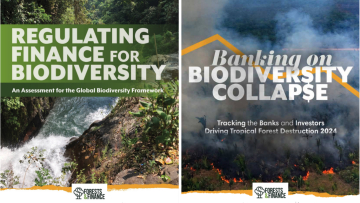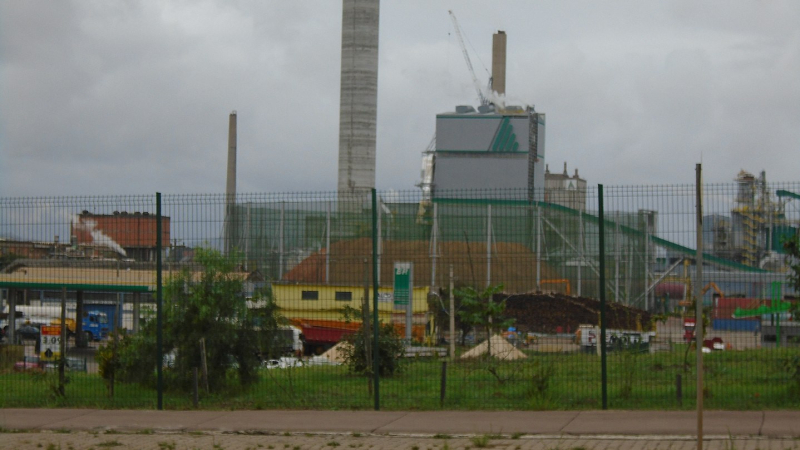
Company – On record
This profile is no longer actively maintained, with the information now possibly out of dateEnvironmental Paper Network
nature@banktrack.org

Company – On record
This profile is no longer actively maintained, with the information now possibly out of dateEnvironmental Paper Network
nature@banktrack.org
Why this profile?
CMPC has several large monoculture plantations in Chile for its pulp and paper production, which have harmful impacts on biodiversity and the climate. In addition, the company’s reliance on biomass power plants puts further pressure on ecosystems and the climate. CMPC and its subsidiaries have been involved in numerous violent conflicts with the Mapuche Indigenous Peoples.
| Sectors | Pulp, Paper and Paperboard Mills |
| Headquarters |
|
| Ownership |
CMPC is a publicly traded company controlled by the Matte Group with a 55.5% stake |
| Subsidiaries |
Bosques del Plata – Chile
CMPC Celulosa – Chile CMPC Celulosa Riograndense – Chile CMPC Madera – Chile CMPC Pulp – Chile Forestal Minico – Chile |
| Website | https://www.cmpc.com/ |
CMPC (Compañía Manufacturera de Papeles y Cartones) is a pulp and paper company in Santiago de Chile. Together with Arauco, it is one of the two biggest plantation companies in Chile. The company exports its products globally and operates in four business areas: wood, pulp, paper & paper products and tissue. The company’s forest assets are located in Brazil, Chile and Argentina, and its manufacturing operations are located in Chile and Brazil. CMPC’s celulose plants in Sante Fe and Laja are powered by biomass plants. CMPC Celulosa produces wood pellets and other wood biomass in several Latin American countries and exports them to Europe and Africa.
Impact on human rights and communities
Violent conflicts: CMPC's activities in Chile are linked to numerous conflicts with the Mapuche population as well as murders and other violent incidents causing political and social conflicts. CMPC has a long history of involvement in land conflicts in Chile, dating back to the 1970s. At the time, the military dictatorship distributed hundreds of thousands of hectares to plantation companies, without consulting or compensating the traditional owners of these lands, many of which were Indigenous Mapuche people. Local groups such as Arauco Malleco Coordination (CAM), Lafkenche Mapuche Resistance (RML), Weichan Auka Mapu (WAM) demand the return of the land occupied by CMPC. According to Mapuche activists, Forestal Mininco, the forestry arm of CMPC, hired paramilitary forces to face the demand of land restitutions by Indigenous communities, intensifying the conflict.
Indigenous lands: With the support of the military dictatorship, forestry companies like CMPC and Arauco acquired large tracts of land in Chile destined to become monoculture forestry plantations. The industry is ever-growing and the impacts of Indigenous territories continues. The CMPC holding company alone owns 170,000 hectares of the approximately 450,000 hectares in the Araucanía region in Chile. Tree plantations in the traditional Mapuche territory account for an area three times greater than the Indigenous lands recognised by the state. Most of the tree plantations have been established on traditional Mapuche lands. The communities affected by this industry are claiming their right to tenure over the lands occupied by the plantations, which were usurped from them both during the colonial era and following the military coup of 1973. The conflicts about land rights have resulted in the criminalisation of community members and leaders who have occupied disputed landholdings.
According to the forestry commission of the Coordinating Committee of Mapuche Territorial Organizations and Identities, “the territorial conflict with the forestry companies is a fight for survival, for rights, dignity, recognition, and the possibility of autonomous development. For the coordinating committee, stopping the expansion of the forestry sector is also a means of preventing this activity from provoking even greater impoverishment, environmental damage and cultural deterioration for the Mapuche people and vast sectors of society.”
Impact on nature and environment
Loss of forests caused by plantations: Chile is home to the second largest coastal temperate rainforest on the planet. Over half of these rich coastal forests have been cleared, according to the World Resources Institute, in a process that has accelerated over the last half century. Timber plantations expanded by a factor of ten between 1975 and 2007. They now occupy 43% of the Southern-central Chilean territory.
A scientific analysis of satellite images of native forests in the Nahuelbuta Mountain Range between the Bio Bío and Araucanía regions reported that, in the 25 years between 1986 and 2011, a third of natural forests were replaced by timber monocultures. A similar study reported a 33.2% loss of natural forests in the Cordillera de Nahuelbuta.
The expansion of industrial plantations at the cost of natural forest is not reported as deforestation, because the Food and Agriculture Organisation (FAO) of the United Nations includes tree plantations in its definition of forest cover. However, this land use change has dramatically impoverished the rich biodiversity that once shaped these regions.
Impact on water tables: The land often populated by the Mapuche people is progressively drying out, because the industrial plantations that surround it distort the natural functioning of the water table. For example, eucalyptus requires an average of 30 litres of water every day. When planted at a density of 400 trees per hectare, a plantation may absorb 12,000 litres per hectare every day. Pine requires less, although like other plantation species, it still requires large amounts of water, as well as nutrients, to maintain its rapid rate of growth. Therefore monoculture tree plantations, especially at industrial scale, affect entire landscapes, impacting on the water table, reshaping flora and fauna and modifying soil quality. Moreover there is no such remedy for the water shortage of natural forests. This is concerning, since the degradation of the water table is happening in conjunction with higher temperatures caused by global climate change.
Forestal Mininco, the forestry arm of CMPC, has made use of the water of the surrounding Mapuche communities for over 14 years by diverting the channels for irrigation of their eucalyptus and pine plantations. The Mapuche people blame this for their continuous severe droughts and consequent loss of their crops, alongside the remaining natural forests.
Drought and forest fires: A further threat to natural forests, caused by industrial tree plantations draining the land and exacerbated by climate change, is the growing risk of forest fires. Scientists have found that non-native pine and eucalyptus forests planted to supply pulp and timber mills in central Chile are contributing to the massive fires. Other studies have indicated that Chile’s plantations are affecting anthropogenic climate change, the growing area of urban-rural interface (areas where housing and vegetation formations converge or mix) and the increase in forest plantations of species of high flammability, among others” and that “the conversion of land to rapid growth plantations increases the risk of fires.”
Biomass use: CMPC operates multiple biomass power plants like the Santa Fe Biomass Power Plant in Bio Bio, Chile. The company’s subsidiary, CMPC Celulosa, also produces wood pellets and other wood biomass in several Latin American countries and exports these products to Europe and Africa. The production and combustion of wood biomass is associated with numerous social and environmental conflicts. Wood biomass is anything but carbon neutral and ecologically sustainable. In fact, biomass combustion burns more CO2 per unit of energy than fossil fuels, further fueling climate change. In addition to deforestation to produce wood for burning, large forested areas are also being burned or cleared to grow crops as biomass. The demand for woody biomass contributes to land grabbing, which threatens the rights, interests, and livelihoods of Indigenous Peoples and local communities.
Impact on pandemics
Wood biomass is associated with high rates of deforestation as well as monocultures of various crops. There is a growing body of evidence that shows the connection between deforestation and an increased risk for disease outbreaks and pandemics. For example, monocultures like eucalyptus plantations reduce biodiversity leaving species like rats and mosquitoes, which are more likely to spread dangerous pathogens, to thrive. This biodiversity decline results in a loss of natural disease regulation and poses a risk for human, animal and environmental health.
The Chilean pulp industry, which includes CMPC and Forestal Mininco but also its competitors, is heavily dependent on governmental support in the form of favourable legislation and subsidies. A large part of this support was provided by the 1974 Decree 701, which promoted the expansion of plantations through generous land distribution and large subsidies. The subsidies covered 75% of the production costs of plantations and it exempted the sector from taxes. This Decree was extended several times until 2015.
2024
2024-02-06 00:00:00 | Chile's largest forestry companies Arauco and CMPC responsible for devastating forest fires
The International Rights of Nature Tribunal held its 11th Local Tribunal in the Biobío region in Chile on January 12 2024 focusing on the violations of the Rights of Nature arising from the forestry model and the devastating forest fires of 2023. The judges listened to the testimonies and evidence from experts, affected communities, and activists, reflecting the catastrophic impact of the forestry model on communities and the ecosystem. The judges concluded that forestry companies such as Arauco and CMPC were responsible for environmental destruction and compromising the fundamental rights of local communities. Read the full report from the proceedings.

